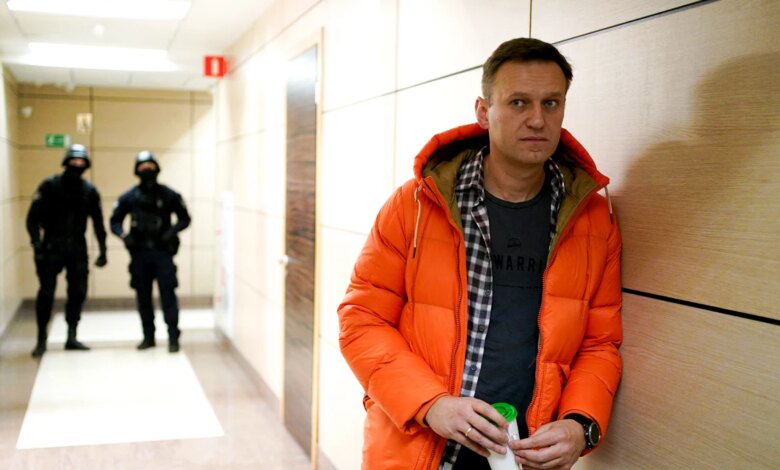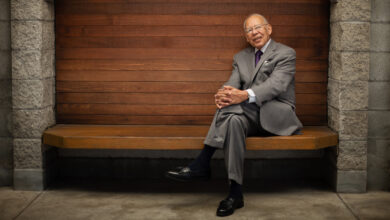What a Murdered Russian Dissident Can Teach Us Ab…

This piece was adapted from Russell Moore’s newsletter. Subscribe here.
Russian president Vladimir Putin murdered another Christian this week. It was just another day in Putin’s supposed project of protecting “the Christian West” from godlessness. After all, they tell me, one can’t create a Christian nationalist empire without killing some people.
Before the world forgets the corpse of Alexei Navalny in the subzero environs of an Arctic penal colony, we ought to look at him—especially those of us who follow Jesus Christ—to see what moral courage actually is.
Navalny was perhaps the most-recognized anti-Putin dissident in the world, and he is now one of many Putin enemies to end up “suddenly dead.” He survived poisoning in 2020, recuperated in Europe, and ultimately went back to his homeland despite knowing what he would face. Speaking of his dissent and his willingness to bear its consequences, Navalny repeatedly referenced his profession of Christian faith. My Christianity Today colleague Emily Belz discovered a 2021 trial transcript at Meduza, in which Navalny explains, in strikingly biblical terms, what it means to suffer for one’s beliefs.
“The fact is that I am a Christian, which usually sets me up as an example for constant ridicule in the Anti-Corruption Foundation, because mostly our people are atheists, and I was once quite a militant atheist myself,” Navalny said (as rendered by Google Translate). “But now I am a believer, and that helps me a lot in my activities because everything becomes much, much easier.”
“There are fewer dilemmas in my life, because there is a book in which, in general, it is more or less clearly written what action to take in every situation,” he explained. “It’s not always easy to follow this book, of course, but I am actually trying.”
Specifically, Navalny said, he was motivated by the words of Jesus: “Blessed are those who hunger and thirst for righteousness, for they will be satisfied” (Matt. 5:6, NASB).
“I’ve always thought that this particular commandment is more or less an instruction to activity,” Navalny said. “And so, while certainly not really enjoying the place where I am, I have no regrets about coming back or about what I’m doing. It’s fine, because I did the right thing.”
“On the contrary, I feel a real kind of satisfaction,” he said. “Because at some difficult moment I did as required by the instructions and did not betray the commandment.”
These words may seem a bit too easy. After all, an unbeliever might respond, most of the people in the pro-democracy, anti-tyranny movement of which Navalny was a part did not, in fact, believe “the instructions” of Scripture. And Putin himself is backed by key leaders of the Russian Orthodox Church, where some are as willing as any court prophets ever were to baptize his murder in the language of Christian virtue and Christian civilization. (Though there are examples of faithful dissidence too.)
But that response would miss Navalny’s point. He was not saying that Christians are courageous while unbelievers are not. There is ample evidence to the contrary—in Russia and other places too—to put such notions to flight.
Navalny recognized, though, that the allure of moral cowardice when standing in courage means standing alone. A conscience can always reassure itself that being quiet right now is the right thing. Navalny recognized the terror in the thought of being left outside a field of belonging—being branded as a traitor by fellow countrymen and a heretic by fellow churchmen.
To resist the pull of that mob requires a different motive than a better-than-even chance of political “success.” Navalny recognized that one must, as the evangelical missionary Jim Eliot once put it, embrace “strangerhood.”
“For a modern person this whole commandment—‘blessed,’ ‘thirsty,’ ‘hungry for righteousness,’ ‘for they shall be satisfied’—it sounds, of course, very pompous,” Navalny said. “Sounds a little strange, to be honest.”
“Well, people who say such things are supposed, frankly speaking, to look crazy,” he recognized. “Crazy, strange people, sitting there with disheveled hair in their cell and trying to cheer themselves up with something, although they are lonely, they are loners, because no one needs them.”
“And this is the most important thing that our government and the entire system are trying to tell such people: You are alone,” he continued. “You are a loner. First, it is important to intimidate, and then, prove that you are alone.”
In this, Navalny not only identified his own motives for conscientious strangeness—he also contradicted the very nature of the Putinist conception of Christianity. To be “Christian,” in such a regime, is to be a Russian (or whatever the local blood-and-soil equivalent is). To be “Christian” is to be a “regular” person—unwilling to step out of line, to expose one’s conscience to any thought that might bring hardship.
After Navalny’s killing, The Free Press published letters between Navalny and the famed former Soviet dissident Natan Sharansky, who served time in the same Artic penal colony during some of the most dangerous years of the Communist regime. Biblical passages are quoted throughout, including Navalny joking about “where else to spend Holy Week” than in the prison complex the older man called his “alma mater.”
This was the root, I believe, of Navalny’s moral courage, his willingness to stand alone, his willingness to die. It’s not just that he knew Bible verses; the pro-Putin patriarch of the Russian Orthodox Church no doubt knows more. It’s the way he seemed to know Scripture. He seemed to recognize not just the bare “instructions” from Jesus about hungering and thirsting for righteousness, about being blessed in persecution, but also the story behind and around them. He knew these words seem strange. He knew they sound crazy.
In the introduction to his collection of poems on joy, the poet Christian Wiman notes that early audiences of the New Testament message, offended by the strangeness of what they heard, “might very well have made their way home past rows of crucified corpses designed specially to eradicate all cause for any insurrectionist hope or joy.” The strangeness was the point. No one can actually hear what Jesus is saying when he calls the forgotten, the persecuted, the poor, and the reviled “blessed” unless we feel why his own family thought he was insane (Mark 3:21).
This is probably why Navalny recognized so clearly the Putin regime’s methods of making dissenters feel strange and crazy and alone: Navalny had seen it before, in a Roman Empire that did the same thing with crosses.
Those of moral courage of all faiths and no faith have all kinds of motivations for their convictions. But—whatever the motivation—one cannot maintain moral courage if one is unwilling to be sent away from whatever one calls “my home,” from whomever one calls “my people.” That’s the joyful irony: One never stands alone when one is part of a bigger story, when one belongs to a bigger body.
The cloud of witnesses includes Elijah and Jeremiah, Peter and Paul, Maximus and Bonhoeffer, and countless others who died seemingly abandoned, who seemed crazy in their day (Heb. 12:1). It’s people like this—not from the “German Christian” Reich bishops or the Putin-cheering Orthodox patriarchate—from whom the next generation of our faith is born.
The very point of “hungering” and “thirsting” is that one is prompted to see that something’s missing—that the satisfactions on offer aren’t enough. The very appetite for such things is a sign that what one is hungering for, thirsting for, is really out there.
A person can see that, sometimes, even from a gulag. That’s strange. That’s crazy. But that’s what at least one Person I know would call “blessed.”
Russell Moore is the editor in chief at Christianity Today and leads its Public Theology Project.




